Filter by

Dynamic approaches to global economic challenges : festschrift in honor of Ka…
This book addresses three big economic challenges from a dynamic perspective: European integration, economic growth, and global climate change. In the light of the recent crises of the European Union (EU), the first part of the book deals with challenges to the real, monetary and fiscal integration of the EU and required institutional adjustments. The second part of the book addresses fundament…
- Edition
- -
- ISBN/ISSN
- 9783319233246
- Collation
- -
- Series Title
- -
- Call Number
- 337
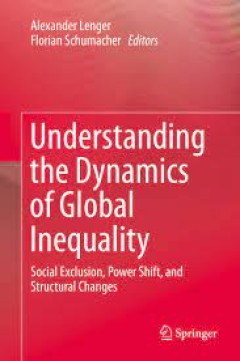
Understanding the Dynamics of Global Inequality Social Exclusion, Power Shif…
Despite the fact that the globalization process tends to reinforce existing inequality structures and generate new areas of inequality on multiple levels, systematic analyses on this very important field remain scarce. Hence, this book approaches the complex question of inequality not only from different regional perspectives, covering Africa, Asia, Europe, Latin and Northern America, but also …
- Edition
- -
- ISBN/ISSN
- 978-3-662-44766-6
- Collation
- 8 b/w illustrations
- Series Title
- -
- Call Number
- -
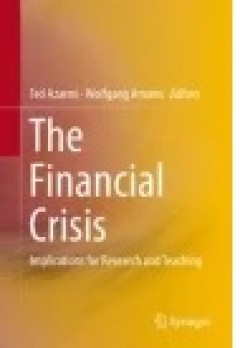
The Financial Crisis
This book brings together a good mix of academics and practitioners for a discussion that focuses on how to change financial practice and the academic field of finance in order to understand the current financial crisis and deal with future turbulent financial times. The volume is based on contributions by prominent academics and practitioners from Europe, Asia and the USA. The book contains se…
- Edition
- -
- ISBN/ISSN
- 978-3-319-20588-5
- Collation
- XI, 175
- Series Title
- -
- Call Number
- -
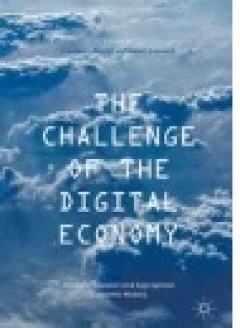
The Challenge of the Digital Economy
This volume presents contributions that analyse the extraordinary impact of digital technology on business, services, and the production of value in many sectors of the economy. At the heart of this book is the fact that the entire digital economy is now worth almost 6% of global GDP, and it continues to grow at an unprecedented rate. The volume covers the general debate on taxation and the dig…
- Edition
- -
- ISBN/ISSN
- 978-3-319-43690-6
- Collation
- XVII, 148
- Series Title
- -
- Call Number
- -
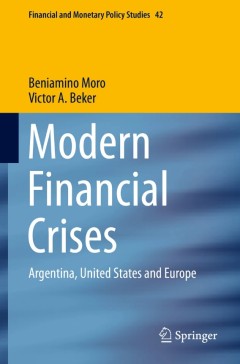
Modern Financial Crises
This book is devoted to the analysis of the three main financial crises that have marked this century: 2001 Argentina’s defaulting on its external debt, the American subprime crisis in 2008, and the current European debt crisis in Europe. The book pursues three major objectives: firstly, to accurately portray these three financial crises; secondly, to analyze what went wrong with mainstream e…
- Edition
- 1
- ISBN/ISSN
- 978-3-319-20990-6
- Collation
- XVII, 257
- Series Title
- Financial and Monetary Policy Studies
- Call Number
- -
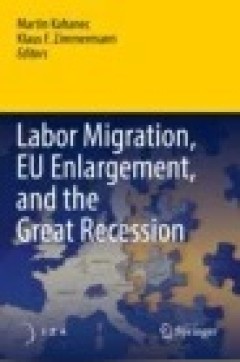
Labor Migration, EU Enlargement, and the Great Recession
This volume extends and deepens our knowledge about cross-border mobility and its role in an enlarged EU. More specifically, its main purpose is to enlighten the growing and yet rather uninformed debate about the role of post-enlargement migration for economic adjustment in the crisis-stricken labor markets of the Eurozone and the EU as a whole. The book addresses the political economy aspects …
- Edition
- -
- ISBN/ISSN
- 978-3-662-45320-9
- Collation
- -
- Series Title
- -
- Call Number
- -
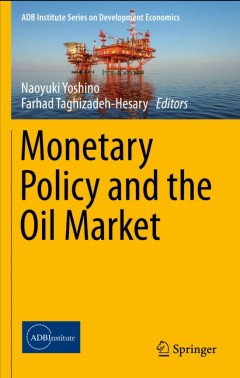
Monetary Policy and the Oil Market
While oil price fluctuations in the past can be explained by pure supply factors, this book argues that it is monetary policy that plays a significant role in setting global oil prices. It is a key factor often neglected in much of the earlier literature on the determinants of asset prices, including oil prices. However, this book presents a framework for modeling oil prices while incorporating…
- Edition
- 1
- ISBN/ISSN
- 978-4-431-55796-8
- Collation
- -
- Series Title
- -
- Call Number
- -
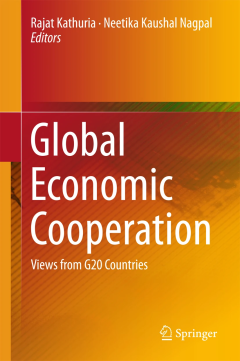
Global Economic Cooperation
This book discusses issues such as global financial crisis and global governance, food security, energy sustainability, the global financial system, trade and protectionism, and growth and employment. Since the outbreak of the financial as well as national debt crises in the Euro zone, the focus of the G20 has shifted back to addressing short-term issues. These issues range from the dynamic eff…
- Edition
- -
- ISBN/ISSN
- 978-81-322-2696-3
- Collation
- XIX, 265
- Series Title
- -
- Call Number
- 330 GLO

European Yearbook of International Economic Law 2015
This sixth volume (2015) of the European Yearbook of International Economic Law puts a particular emphasis on non-tariff barriers (NTBs) to trade and the world trade order. With the steady reduction of tariff rates since the GATT 47 came into force, focus in recent years has been on the vast and complex landscape of non-tariff barriers to trade. States as well as scholars seemingly struggle wit…
- Edition
- -
- ISBN/ISSN
- -
- Collation
- -
- Series Title
- -
- Call Number
- -

Italy’s Top Products in World Trade: The Fortis-Corradini Index
This book analyzes Italy’s external competitiveness in detail and introduces a new index, devised by Marco Fortis and Stefano Corradini for Fondazione Edison, that highlights the strengths of Italy’s foreign trade. Compared with the Trade Performance Index compiled and updated annually by UNCTAD/WTO’s International Trade Centre, the Fortis-Corradini Index (FCI) provides greater sectorial …
- Edition
- -
- ISBN/ISSN
- 978-3-319-15817-4
- Collation
- -
- Series Title
- -
- Call Number
- -
 Computer Science, Information & General Works
Computer Science, Information & General Works  Philosophy & Psychology
Philosophy & Psychology  Religion
Religion  Social Sciences
Social Sciences  Language
Language  Pure Science
Pure Science  Applied Sciences
Applied Sciences  Art & Recreation
Art & Recreation  Literature
Literature  History & Geography
History & Geography